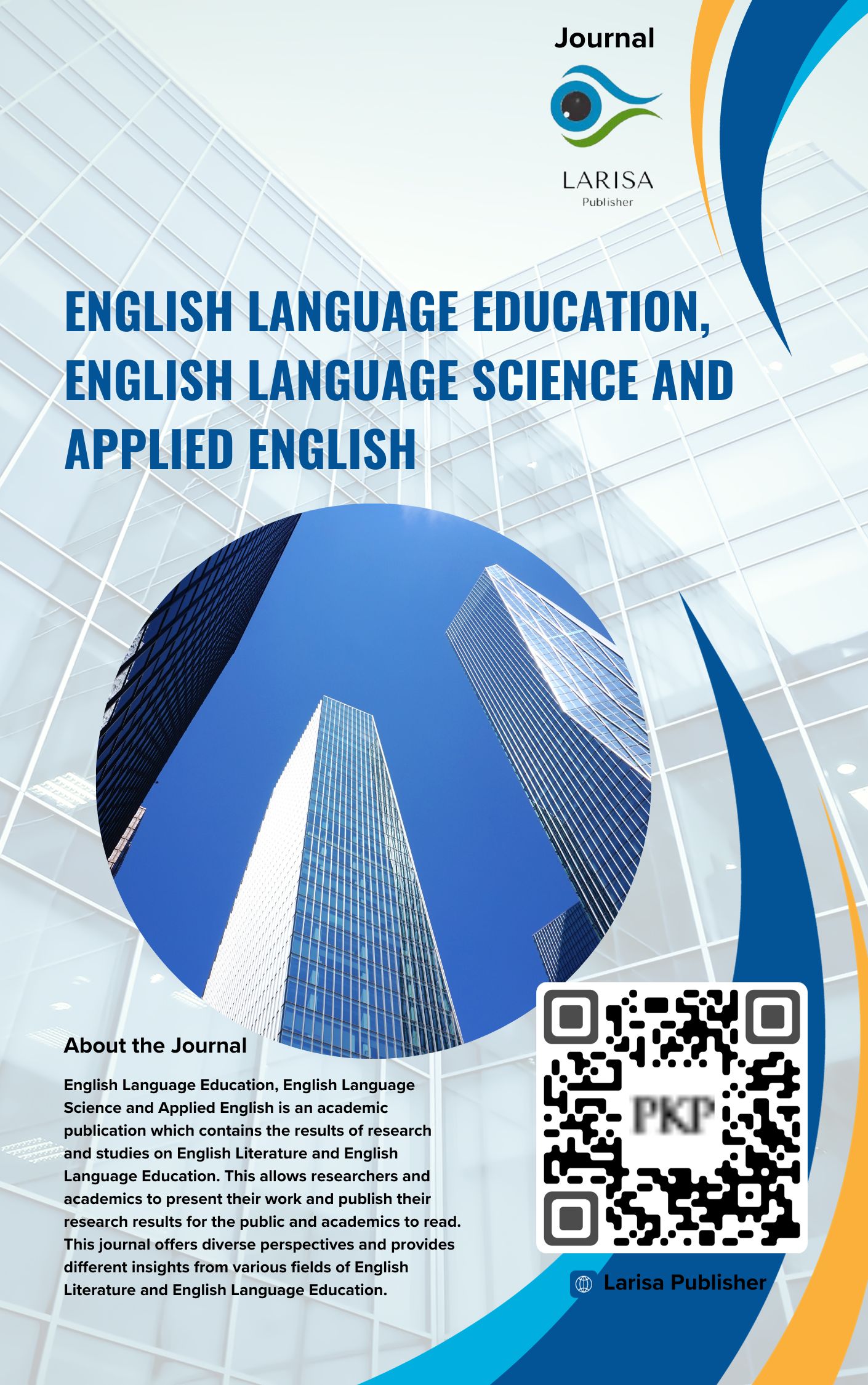English Language Learning Management for Class VII Students at SMP Negeri 4 Pakemekasan Through Short Films
Kata Kunci:
English Language, learning management, and short filmAbstrak
Tujuan dari penelitian ini adalah untuk mengidentifikasi metode manajemen pembelajaran film pendek dalam pembelajaran Bahasa Inggris di SMP Negeri 4 Pamekasan, untuk menentukan faktor-faktor utama yang menghambat siswa dalam menggunakan Bahasa Inggris secara langsung, dan untuk menganalisis hasil dari latihan manajemen film pendek. Penelitian kualitatif adalah jenis penelitian yang mengumpulkan data melalui wawancara, observasi, dan dokumentasi. Data yang digunakan dalam penelitian ini berasal dari guru bahasa Inggris, staf tata usaha, dan siswa. Analisis yang digunakan termasuk pengurangan, presentasi, kesimpulan, dan verifikasi. Hasil keseluruhan berdasarkan data film pendek yang digunakan untuk mengatur pembelajaran bahasa Inggris menunjukkan bahwa pendekatan manajemen yang digunakan di sekolah tersebut efektif. Ini terlihat dari nilai belajar siswa yang semakin bagus sesuai dengan nilai KKM dan prestasi siswa yang sering memenangkan kejuaraan lomba bahasa Inggris
Unduhan
Referensi
Aryanika, S. (2015). Manajemen Pembelajaran Bahasa Inggris: Studi pada Kelas Unggulan SMA Negeri I Metro Lampung
Ahmadi, H. A., & Supriyono, W. (1991). Psikologi belajar. PT Rineka Cipta.
Askatriyani. (2014). Pemanfaatan multimedia dalam pembelajaran bahasa Inggris untuk perolehan belajar narrative text, Siswa SMP Pontianak.
Arsyad, Azhar. (2001). Media Pembelajaran. Raja Grafindo Persada.
Aufa, N. (2017). Using Movie to Increase Students’ Pronunciation : Thesis. UIN ArRaniry Banda Aceh.
Crystal, D. (2001). An Encyclopedic Dictionary of Language and Languages (2nd ed.). Penguin Books.
Kabadayi, L. (2012). The role of short film in education Procedia - Soc. 316–20
Sugiyono. (2016). Metode Penelitian Kuantitatif, Kualitatif dan R&D. Bandung: Alfabeta.
Sagala, S. (2011). Konsep dan Makna Pembelajaran. Alfabeta
Tarigan, H. G. (2013). Menulis: Sebagai Suatu Keterampilan Berbahasa. Bandung: Angkasa
Amrullah, F., & Susilo, M. J. (2019). Identifikasi Sarana dan Prasarana Pendukung Pelaksanaan Sekolah Adiwiyata di SMA Negeri Kota Yogyakarta. Symposium of Biology Education (Symbion), 316–322. https://doi.org/10.26555/symbion.3554
Mulawarman, W. G., & Noviyanti, N. (2020). Manajemen Bahasa Penulisan Proposal Mahasiswa Nonkeba hasaan. Diglosia: Jurnal Kajian Bahasa, Sastra, Dan Pengajarannya, 3(1), 53- 64.https://doi.org/10.30872/diglosia.v3i1.49
Sumar, W. T. (2020). Pengelolaan Kelas dalam Meningkatkan Motivasi Belajar Siswa. Jambura Journal of Educational Management, 1 (1), 49–59. https://doi.org/10.37411/jjem.v1i1.105
Rozaq, A., & Sofyana, L. (2019). Pembelajaran Daring Kombinasi Berbasis Whatsapp pada Kelas Karyawan Prodi Teknik Informatika Universitas PGRI Madiun. Jurnal Nasional Pendidikan Teknik Informatika, 81-86
Robbins, Jennifer Niederst. 2018. Learning Web Design-Fifth Edition. Sebastopol: O’Reilly Media, Inc
Richer, Olaf Zawacki and Adnan Qayyum. 2018. Open and Dictance Education in Australia, Europe and the Americas: National Perspectives in a Digital Age. Germany: Springer Open
Faiz, A., Hakam, K. A., Sauri, S., & Ruyadi, Y. (2020). Internalisasi Nilai Kesantunan Berbahasa Melalui Pembelajaran Pai Dan Budi Pekerti. Jurnal Pendidikan Ilmu Sosial.Https://Doi.Org/10.17509/Jpis.V29i1.24382
Jauhari, A. (2018). Realisasi Kesantunan Berbahasa Dalam Proses Belajar Mengajar Bahasa Indonesia Kelas Xi Smkrealisasi Kesantunan Berbahasa Dalam Proses Belajar Mengajar Bahasa Indonesia Kelas Xi Smk. Diksi. Https://Doi.Org/10.21831/Diksi.V25i1.18851
Mahsun, M. (2014). Metode Penelitian Bahasa: Tahapan, Strategi, Dan Tekniknya. Jakarta: Raja Grafindo Persada.
Megawati, F. (2016). Kesulitan Mahasiswa dalam Mencapai Pembelajaran Bahasa Inggris Secara Efektif. PEDAGOGIA: Jurnal Pendidikan, 5(2). https://doi.org/10.21070/pedagogia.v5i2.246
PEMBELAJARAN BAHASA INGGRIS PADA SMAN 3 BATUSANGKAR. Al-Fikrah: Jurnal Manajemen Pendidikan, 5(2). https://doi.org/10.31958/jaf.v5i2.1103
syahputra, P., Saragih, A., Lubis, S., & Muchtar, M. (2017). Study of the Interpreting Techniques used by the Tourist Guides in the Tourism Attractions of North Sumatra. International Journal of English Language and Translation Studies, 05(03).
Aini, M. R. (2021). Posisi Bahasa Inggris Sebagai Bahasa Kedua Dan Pembuatan Lembar Kerja Peserta Didik Bagi Siswa Smp/Mts Se Kota Blitar. Jabn, 2(1).
Al Zumor, A. W. Q., Al Refaai, I. K., Eddin, E. A. B., & Al-Rahman, F. H. A. (2013). Efl Students’ Perceptions Of A Blended Learning Environment: Advantages, Limitations And Suggestions For Improvement. English Language Teaching, 6(10), 95–110.
Zaim, M. (2013). Asesmen Otentik: Implementasi Dan Permasalahannya Dalam Pembelajaran Bahasa Inggris Di Sekolah Menengah. International Conference On Languages And Arts, 0(0), Article 0.
Teng, (Mark) Feng. (2020). The Benefits Of Metacognitive Reading Strategy Awareness Instruction For Young Learners Of English As A Second Language. Literacy, 54(1), 29–39.
Sunggoro, S., Ulfiah, Ghoer, H. F., & Kosasih, U. (2022). Factory Learning Management In Growing The Entrepreneurship Of Vocational School Students In Karawang District (Case Study At Smk Rismatek Karawang And Smk Lentera Bangsa Karawang). Journal Of Industrial Engineering & Management Research, 3(3).
Solikhah, I. (2017). Penerapan Metode Role Play Pada Matakuliah Public Speaking Untuk Mahasiswa Jurusan Pendidikan Bahasa Inggris Di Iain Surakarta. Lingua : Jurnal Bahasa, Sastra, Dan Pengajarannya, 14(1).
Purandina, I. P. Y., & Juliari, I. G. A. I. T. (2021). Pengenalan Literasi Digital Melalui Cerita Narasi Berbahasa Inggris Pada Aplikasi Youtube Sebagai Penanaman Karakter Anak. Widya Accarya, 12(1).
Mahsar, L. (2022). Pembelajaran Bahasa Inggris Menggunakan Content-Based Instruction (Cbi) Dalam Meningkatkan Kemampuan Berbahasa Di Sekolah Tinggi Pariwisata Mataram. Media Bina Ilmiah, 16(12).
Diterbitkan
Terbitan
Bagian
Lisensi

Artikel ini berlisensiCreative Commons Attribution-ShareAlike 4.0 International License.
Lisensi
Lisensi Creative Commons
Jurnal di publikasi oleh English Language Education, English Language Science and Applied English berlisensi Creative Commons Attribution-ShareAlike 4.0 International License
Anda bebas untuk:
Bagikan — menyalin dan mendistribusikan ulang materi dalam media atau format apa pun
Beradaptasi — remix, ubah, dan kembangkan materi untuk tujuan apa pun, bahkan secara komersial
Di bawah ketentuan berikut:
Atribusi — Anda harus memberikan kredit yang sesuai, memberikan tautan ke lisensi, dan menunjukkan jika ada perubahan. Anda dapat melakukannya dengan cara apa pun yang wajar, tetapi tidak dengan cara apa pun yang menunjukkan bahwa pemberi lisensi mendukung Anda atau penggunaan Anda.
Berbagi Serupa — Jika Anda mencampur, mengubah, atau membuat berdasarkan materi, Anda harus mendistribusikan kontribusi Anda di bawah lisensi yang sama seperti aslinya
Tidak ada batasan tambahan — Anda tidak boleh menerapkan ketentuan hukum atau tindakan teknologi yang secara hukum membatasi orang lain untuk melakukan apa pun yang diizinkan oleh lisensi














